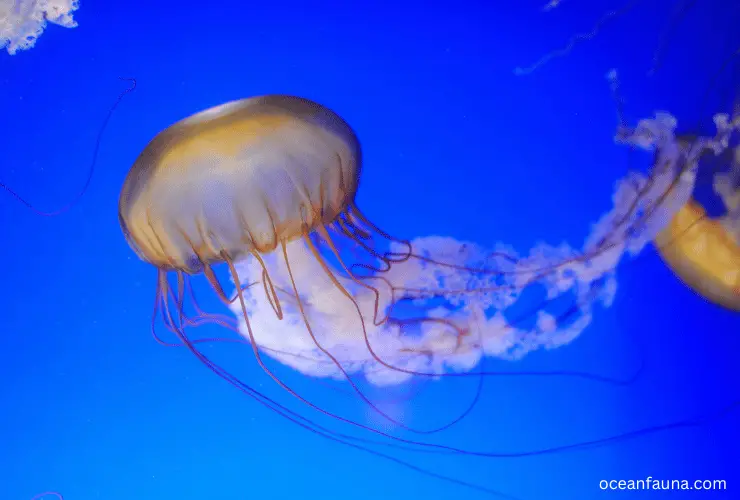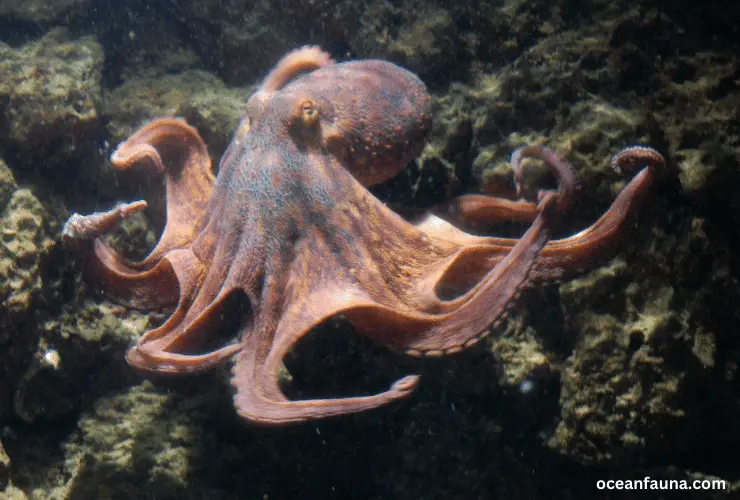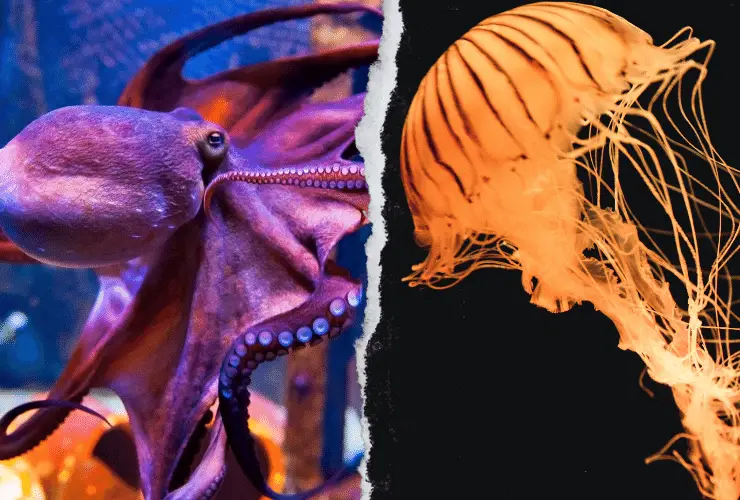Yes, octopuses are known to eat jellyfish on occasion. Octopuses are carnivorous creatures that feed on a variety of prey, including crustaceans, mollusks, and fish.
While jellyfish are not a common part of their diet, they have been known to consume jellyfish when other food sources are scarce. Or they even consume jellyfish when they encounter a particularly palatable jellyfish species.
Octopuses have powerful beaks that allow them to break through the tough outer membranes of jellyfish. It allows them to feed on the soft inner tissues.
Moreover, Octopuses can handle jellyfish stinging cells with protective mucus secretion. It allows octopuses to consume jellyfish in scarcity.
What Do Jellyfish Consist of?
Jellyfish are a type of planktonic animal that float in the ocean and are comprised primarily of water and gelatinous material.

They are considered a type of marine invertebrate and are usually found in shallow waters along coastlines.
Octopus and Jellyfish: Natural Interactions in the Ocean
Octopus and jellyfish are common inhabitants of the ocean and are known to interact with each other in various ways.
While octopus can prey on jellyfish, they can also be stung by jellyfish, which can cause discomfort and potential harm to the octopus.
In some cases, jellyfish can be a potential food source for octopus, especially when other food sources are scarce.
Evidence of Octopus Consuming Jellyfish
Several instances of octopuses eating jellyfish have been documented. This is likely to happen when jellyfish are readily accessible, and the octopus is hungry.
Octopuses have been seen using their tentacles to grasp jellyfish, bring it close, and then use their beak to break them down into smaller pieces.
In some scenarios, octopuses have been observed consuming jellyfish for an extended period, indicating that jellyfish might play a crucial role in their diet.
The Nutritional Benefits of Jellyfish for Octopus
While jellyfish may not be a significant food source for octopus, they can provide essential nutrients and energy. Jellyfish are high in protein, which is essential for growth and survival.
They also contain vitamins and minerals that are important for the overall health and wellbeing of the octopus.
Additionally, jellyfish contain a low amount of fat, making them a relatively low-calorie food source for the octopus.
Potential Risks of Octopus Eating Jellyfish
While jellyfish can provide essential nutrients for octopus, they can also pose potential risks. Many species of jellyfish contain toxic stinging cells called nematocysts, which can cause harm to the octopus if ingested.

Additionally, some species of jellyfish are known to be toxic to other marine animals, including octopus. Therefore, it is important for octopus to be cautious when consuming jellyfish and to only eat those that are safe and not harmful.
FAQs
Is it possible to get stung by a dead jellyfish?
Avoid touching jellyfish that have washed up on the shore, as even though they are dead, their tentacles still contain venom that can cause a sting if touched.
Can jellyfish live forever?
No, jellyfish cannot live forever. While some species of jellyfish have the ability to revert back to an earlier stage of development after reaching maturity, this process is not a form of immortality.
It is simply a mechanism for ensuring the survival of the species in adverse conditions, such as a shortage of food or a changing environment.
So while jellyfish have an unusual life cycle that allows them to persist under certain conditions, they are not immortal and will eventually reach the end of their life span.
Do jellyfish feel emotion?
As far as scientists know, jellyfish do not have the capacity for emotions like humans or other higher animals. Emotions are complex psychological phenomena that are thought to be generated by the activity of specialized brain regions.
Jellyfish, being simple creatures, do not have a brain or any centralized nervous system. So they are not capable of producing emotions. Instead, their behavior is driven by simple reflexes and responses to stimuli in their environment.
Conclusion
In conclusion, octopus and jellyfish are common inhabitants of the ocean and have a complex relationship with each other.
While octopus can consume jellyfish as a food source, they must be cautious and only eat those that are safe and not harmful.
The relationship between octopuses and jellyfish highlights the significance of comprehending ocean food chains and each species’ role in maintaining a balanced ecosystem.

